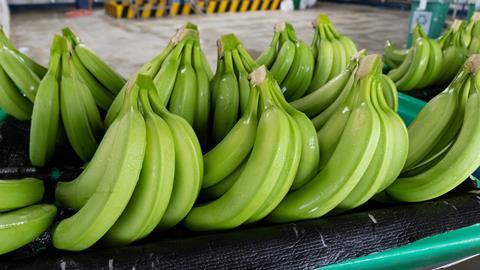An event highlighting the importance of sustainability standards for the Ecuadorean banana sector was held in Berlin this month
Policy makers and experts from the banana sector and non-profit organisations gathered in Berlin earlier this month to hear about the sustainability efforts of Ecuador’s banana sector.

The event, which took place in the auspices of Fruit Logistica, discussed the progress made so far, and explored ways to further enhance and promote sustainable practices.
Bananas are Ecuador’s most exported agricultural commodity, and the country is the largest exporter of bananas globally.
The event heard how the industry has faced multiple challenges in recent years which have required a joint strategic vision of all the participants in the banana value chain, as well as comprehensive sustainability and competitiveness strategies, and a process of continuous improvement in order to adapt to the markets demands.
Ana María Gallardo Cornejo, Ecuador’s vice-minister of exports, stressed that collaboration between the private and public sector was “essential to improve productivity, competitiveness, traceability but above all sustainability that allow us to implement strategies in positioning Ecuador in one of the best countries that produce premium quality products”.
Ecuador’s banana industry faces a number of environmental challenges, such as reduced water availability, pests and rising temperatures. Despite these, Agriculture Minister Bernardo Manzano Díaz highlighted the government’s efforts and dedication to promote sustainable farming including improved water management, boosting the production of organic bananas and the implementation of good agricultural practices in plantations.
The event heard how Ecuador has also made substantial progress in the field of social rights, such as embedding a law obliging farms to adhere to the living wage in the constitution, which mandates the payment of a living wage to their workers for a standard 40-hour working week.
Carlos Febres-Cordero, vice-minister for labour, told delegates how the Ministry of Labour has ramped up inspections to ensure that workers are treated fairly and have access to the rights and benefits guaranteed by the law.
“Joint efforts between employers, workers, the Ministry of Labour, and international partners is crucial to ensure that the country’s labour regulations are upheld, and the rights of workers are protected,” he said.
This message was reiterated by Ángel Rivero, president of Fenacle (National Federation of Agro-industrial, Peasant and Free Indigenous Workers of Ecuador), which represents more than 35,000 workers in the country’s agricultural sector.
He outlined Fenacle’s priorities for 2023, which include the establishment of a roadmap focusing on the eradication of child labour, training for workers and enforcing freedom of association, improving health coverage, bringing health centres closer to the production area, prevention of violence and promotion of gender equality in the workplace, implementation of new organisational rules and ensuring the accurate payment of a living wage in accordance with the law.
Participants agreed that dialogue, consensus and cooperation between workers, producers and public authorities are the ingredients which will help guarantee that Ecuadorean bananas are produced with respect for the rights and well-being of workers and meet the highest standards of sustainability and quality.



